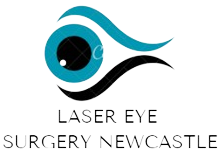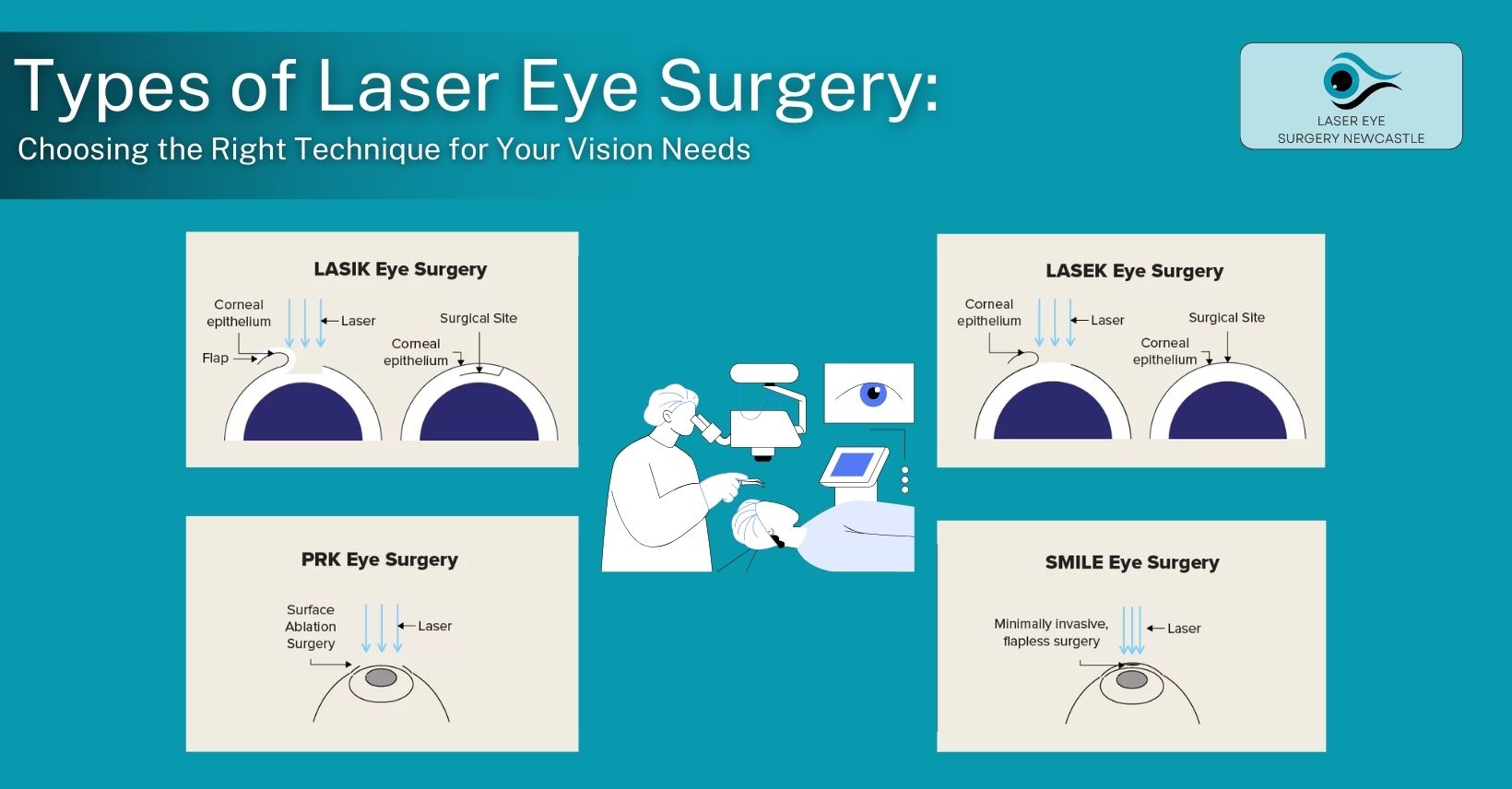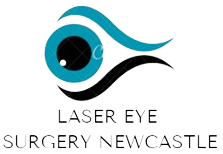Considering laser eye surgery but unsure where to start?
This guide explores the types of laser eye surgery, including types like LASIK, PRK, LASEK, and SMILE. We weigh the pros and cons of each technique to help you make an informed decision.
Laser Eye Surgery Newcastle are here to guide you through the process, from preparation to recovery, ensuring a seamless experience for your vision needs. Discover the best option for your eyesight!
What Is Laser Eye Surgery?
Laser eye surgery targets conditions like short-sightedness, long-sightedness, and astigmatism. It utilises cutting-edge laser technology to reshape the cornea and enhance visual clarity.
Popular techniques include LASIK, LASEK, PRK, and SMILE, each offering unique benefits and precision. These methods have gained favour for their accuracy and minimal recovery time, presenting a viable option for those looking to reduce or eliminate the need for glasses or contact lenses.
As the popularity and application of these surgeries expand, the underlying technology and procedure merit a closer look to appreciate how such precise adjustments are possible.
How Does Laser Eye Surgery Work?
Laser eye surgery employs specialised laser technologies to precisely reshape the cornea, enabling correct light focus on the retina and enhancing vision clarity.
The procedure begins when the ophthalmologist applies numbing drops to ensure patient comfort. Subsequently, a corneal flap is created and lifted, allowing access to the underlying tissue.
The choice of laser, typically an excimer laser, depends on the required vision correction. This laser type emits a cool ultraviolet light that meticulously sculpts the cornea. After the cornea is reshaped, the flap is repositioned to initiate healing.
Comprehending these fundamentals opens the door to further discussing the different laser techniques available for those considering vision correction options.
What Are the Different Types of Laser Eye Surgery?
Several types of laser eye surgeries are available, each utilising different techniques to correct vision issues, including LASIK, LASEK, PRK, and SMILE surgery. These procedures vary regarding recovery time, suitability for different eye conditions, and the specific methods used to reshape the cornea.
LASIK
LASIK, or Laser-Assisted In Situ Keratomileusis, is one of the most popular laser eye surgery procedures, known for its quick recovery time and high success rates.
During a LASIK procedure, a thin flap is created on the cornea using a femtosecond laser to access the underlying tissue. The excimer laser then reshapes the cornea to correct vision issues.
The entire procedure typically takes around 15-20 minutes per eye. Patients experience improved vision immediately after surgery, with minimal discomfort or pain.
The recovery process after LASIK is relatively quick, with most patients returning to normal activities within a day or two. Successful outcomes are common, with a 96% satisfaction rate among patients who have had the procedure.
Advantages of LASIK include reduced dependence on glasses or contacts, improved vision quality, and long-lasting results.
It’s important to consider potential risks such as dry eyes, glare, halos, or undercorrection. These complications are typically rare and temporary; most patients improve their vision without serious side effects.
PRK
PRK, or Photorefractive Keratectomy, is a laser eye surgery technique that involves removing the cornea’s outer layer before reshaping it with laser technology.
During a PRK procedure, the surgeon uses an excimer laser to precisely reshape the cornea, correcting refractive errors such as shortsightedness, longsightedness, and astigmatism.
One of the advantages of PRK over other types of laser eye surgeries, such as LASIK, is that it does not involve creating a flap in the cornea, resulting in a reduced risk of flap-related complications.
Another benefit is that PRK is suitable for individuals with thin corneas who may not be candidates for LASIK.
The recovery process for PRK is typically longer than other procedures, with patients experiencing temporary discomfort and blurred vision as the epithelium regenerates.
LASEK
LASEK, or Laser Epithelial Keratomileusis, is a variant of PRK surgery that involves loosening the corneal epithelium with an alcohol solution before reshaping the cornea with a laser.
Unlike PRK, where the entire epithelium is removed, in LASEK, the thin outer layer is lifted and replaced after the laser treatment, leading to a potentially faster recovery time and reduced risk of corneal haze.
Ensuring that the surgeon performing LASEK is highly qualified and experienced is required, as precision is paramount in achieving the desired visual outcome with minimal risks.
After the procedure, patients must adhere to strict post-operative care instructions, including using prescribed eye drops, avoiding rubbing the eyes and attending follow-up appointments to monitor progress and address concerns.
SMILE
SMILE, short for Small Incision Lenticule Extraction, revolutionises myopia and astigmatism treatment by employing a femtosecond laser to make a precise, small incision in the cornea.
This technique excises a thin lenticule of tissue, eliminating the need for the flap creation typical in LASIK surgeries. The cornea sustains minimal disruption, enhancing recovery speed and reducing complication risks.
SMILE is effective for moderate to severe myopia and astigmatism, which allows patients to achieve perfect or near-perfect vision post-operation, often rapidly. This leads us to a broader discussion of various surgical options and their unique benefits and limitations in eye care.
What are the Pros and Cons of Each Laser Eye Surgery Technique?
Each laser eye surgery technique has advantages and disadvantages, which can impact the decision-making process for patients considering these procedures. Factors such as risks, success rates, and recovery times vary between LASIK, PRK, LASEK, and SMILE surgery.
LASIK
LASIK offers high success rates and a quick recovery time, but it also has certain risks, such as dry eyes and potential flap complications.
One of the main advantages of LASIK is its impressive success rate. The majority of patients achieve greatly improved vision without the need for spectacles or lenses. The recovery time for most individuals is relatively short, allowing them to return to their daily activities quickly.
On the other hand, some common risks associated with LASIK include experiencing dry eyes, halos, glare, and difficulty driving at night. There is a small chance of flap complications during the surgery, although these occurrences are rare.
PRK
PRK is known for its safety and effectiveness, particularly for patients with thin corneas. Still, it involves a longer recovery period and some initial discomfort.
One of PRK’s significant benefits is its ability to cater to individuals with thin corneas who might not be suitable candidates for other laser eye surgeries like LASIK.
PRK minimises the risk of complications associated with creating a corneal flap, a step required in LASIK. However, the extended healing time in PRK can be seen as a drawback, as it may take more days for vision to stabilise than procedures like LASIK.
LASEK
LASEK combines elements of both LASIK and PRK, offering a good balance for patients. Still, it requires diligent aftercare and has a moderate recovery period.
One advantage of LASEK is that it can be suitable for patients with thinner corneas who may not be eligible for LASIK. LASEK involves a smaller incision than LASIK, potentially reducing the risk of certain complications.
On the downside, the recovery process after LASEK can take longer than LASIK, with some patients experiencing discomfort and blurred vision for several days or weeks. Careful aftercare, including using prescribed eye drops and shielding the eyes from bright light, is required to ensure proper healing and minimise the risk of complications.
SMILE
SMILE surgery is highly effective for treating myopia and astigmatism with a minimally invasive approach, leading to a faster recovery and fewer risks of complications.
One of the key advantages of SMILE surgery is its quick recovery time, often allowing patients to resume normal activities within a short period after the procedure. This is due to the smaller incision and reduced disruption of corneal nerves compared to other laser eye surgeries, leading to less post-operative discomfort.
SMILE surgery boasts a lower risk profile as it preserves more corneal strength and stability, reducing the likelihood of issues like dry eye syndrome. Its high success rates in correcting vision also make it a popular choice among patients seeking long-term visual improvement.
Which Laser Eye Surgery Technique is Right for You?
Choosing the right laser eye surgery technique depends on various factors, including your specific eye conditions, lifestyle, and personal preferences, which can be best determined through a thorough consultation with a qualified surgeon.
Factors to Consider Before Choosing a Technique
Before selecting a laser eye surgery technique, it is important to evaluate your specific eye conditions and the surgeon’s qualifications. Various procedures, such as LASIK or PRK, cater to different vision impairments, including short-sightedness, long-sightedness, and astigmatism, each offering unique benefits and potential risks.
A thorough consultation is required, during which your surgeon will assess your eligibility, address concerns, and discuss potential outcomes. The surgeon’s experience and credentials are fundamental to the safety and success of your surgery.
Understanding these factors helps you make an informed decision about your eye care. Regarding these aspects, the right choice of provider can make all the difference in achieving the best results. We invite you to consider what sets our team apart as you plan your path to a clearer vision.
Why Choose Us for your Laser Eye Surgery?
At Laser Eye Surgery Newcastle, we pride ourselves on our affiliation with top-tier clinics like Optical Express and Laser Vision, offering our patients state-of-the-art facilities, experienced surgeons, and personalised care to ensure the best possible outcomes.
Preparing for Your Laser Eye Surgery at Laser Eye Surgery Newcastle
At Laser Eye Surgery Newcastle, your journey to better vision starts with a comprehensive initial consultation. Our expert team evaluates your eye health and eligibility for laser eye surgery. This assessment is vital to customising the treatment for optimal results.
After confirming your suitability, you’ll receive clear pre-operative guidelines, including medication adjustments, clothing recommendations, and transportation arrangements to ensure your comfort and safety on the day of the surgery.
On the day of the procedure, we advise against wearing makeup and eating heavy meals and recommend staying hydrated. Our team will brief you on the procedural steps and post-surgery care, including prescribing eye drops and scheduling follow-up visits to monitor your recovery.
As you prepare for this transformative experience, knowing each phase of the process can ease any concerns and enhance your readiness, allowing for a smoother transition through each stage of your vision correction journey.
What to Expect Before, During, and After the Procedure?
Understanding what to expect before, during, and after your laser eye surgery can help alleviate any concerns and ensure a smooth experience. Ahead of the operation, you’ll undergo a detailed examination and consultation to determine the best treatment plan. During the procedure, advanced laser technology is used to correct your vision, and post-surgery, you’ll receive comprehensive aftercare to support your recovery.
Recovery and Follow-up Care
Recovery and follow-up are crucial for patients after laser eye surgery to ensure proper healing and optimal vision outcomes. The recovery phase starts immediately after the procedure, highlighting the importance of following the ophthalmologist’s aftercare instructions.
Patients often experience swelling and discomfort during the initial days, which typically lessen after the first week. Key recommendations include avoiding eye rubbing, wearing protective eyewear, and adhering to prescribed eye drop regimens.
Regular check-ups are imperative to track healing progress and promptly address emerging concerns. As patients navigate this phase, they rely on their doctor’s expertise to fully recover, setting the stage for long-term visual health.
As we believe the broader implications of laser eye surgery are significant, our upcoming discussion, Your Vision, Our Commitment, will further examine how this commitment to care extends beyond the operating room, shaping the future of patient-centred eye care.
Your Vision, Our Commitment: Concluding Thoughts on Laser Eye Surgery
At Laser Eye Surgery Newcastle, our commitment to our patients extends beyond the procedures themselves. We focus on achieving high success rates and ensuring a smooth recovery process for optimal visual outcomes.
Our experienced ophthalmologists and staff strive to provide personalised care for each individual, customising treatment plans to serve various needs.
Through state-of-the-art technologies and rigorous quality standards, we prioritise safety and efficacy in every process step.
Patient satisfaction is at the core of our practice, and we are dedicated to helping individuals regain clear vision and enhance their quality of life.
From initial consultations to post-operative care, we emphasise open communication and comprehensive support to ensure a positive journey towards improved vision.






